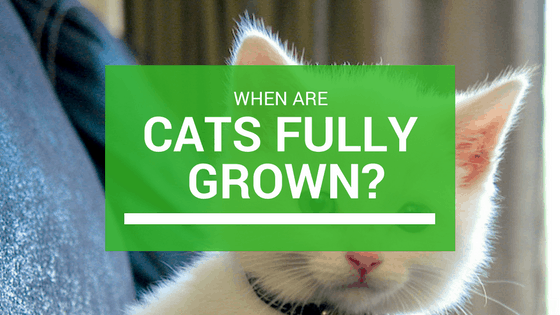When are Cats Fully Grown?
Deep down you know it. That kitty won’t remain a kitten forever. Eventually, your little furball will mature into a fully-grown furry friend. It’s bound to happen, as nature always prevails.
But when are cats fully grown? When is a kitten considered a cat?
Well, that depends on a number of factors. While we’ll throw some general guidelines your way, it’s important to treat each feline differently, as every cat will mature at a different rate.
Contents
In General
While every cat is different, the general guideline is this: once a kitten reaches one year of age, he or she is considered an adult cat. After one year of age, your furball is no longer considered a kitten.
Now, most kittens typically get close to their full-grown size and weight around 9-12 months. After the first year, your cat may continue at a slow rate until around the 18-month mark.
After 18-months, most cats are fully-grown – unless they start eating too much and become overweight. Cats shouldn’t gain much weight after the 18-month mark if they’re following a proper diet and getting good nutrition.
Large Breeds
While the vast majority of cats will enter adulthood after one year, certain large breed cats follow a different timeline. Cats like the Maine Coon Cat may take more time to reach their full size. Certain breeds won’t be fully grown until they’re 2-4 years old.
Sexual Maturity
Most cat owners are concerned about when a cat reaches puberty and therefore can reproduce. As spaying or neutering cats is important for their health and overall well-being.
Most cats require a few months to go from a kitten to reaching sexual maturity. While each cat is different, you can expect your furry friend to hit puberty between 5-9 months.
It’s important to understand that cats can become pregnant during puberty. As such, you’ll want to keep female cats away from male cats during puberty. A kitten’s body may be able to reproduce, but the process will be tough on her maturing body. It’s best to avoid this scenario.
Male cats can begin to sire kittens of their own during puberty, as well. As such, you’ll need to keep male kittens away from all females, too – unless you want more kittens.

When to Spay Or Neuter Cats?
The proper time to fix an animal goes hand-in-hand with when a cat is considered fully-grown. It’s important you speak with your vet if you plan to have the procedure done on your kitten.
Certain vets prefer to spay or neuter kittens before they’re considered fully grown. The reasoning behind this process is sound, as many male cats will not have spraying problems going forward if neutered at a young age.
The Social Side
We know cats rarely behave like dogs. However, a cat going through puberty often displays clingy behavior towards an owner. We humans usually revere this affectionate side.
By the time a cat reaches its second birthday, life as a fully-grown cat is moving forward. Cats who are not fixed often reach this age and become mellow and calm. The affectionate side is usually gone. Some cat owners don’t like this fact.
By spaying or neutering your cat at the right time, you can ensure your cat remains kitten-like for life. A fixed cat often remains playful and fun throughout life with a strong desire for affection.
Nutritional Considerations
The nutritional needs of fully-grown cats change over the years. A kitten will have vastly different nutritional needs than a mature feline. It’s important to adjust your cat’s food intake over time.
Around 12-months, you’ll want to switch your cat’s food from kitten food to adult cat food. You’ll also need to monitor the amount of food your cat eats. Most cats need less food per day after the first year.
If your cat is gaining weight after maturity, you’ll probably want to cut back on the amount of kibble you put in her bowl each day. Fat felines don’t live long and healthy lives.
Consider These Things
When considering whether your cat is fully grown or not, it’s important to note that every feline is different. Use the guidelines above as ideas, not set rules. If you believe your cat isn’t maturing properly, give things some time. If your cat hasn’t hit puberty after the first year, it may be time to see the vet. be time to see the vet.


